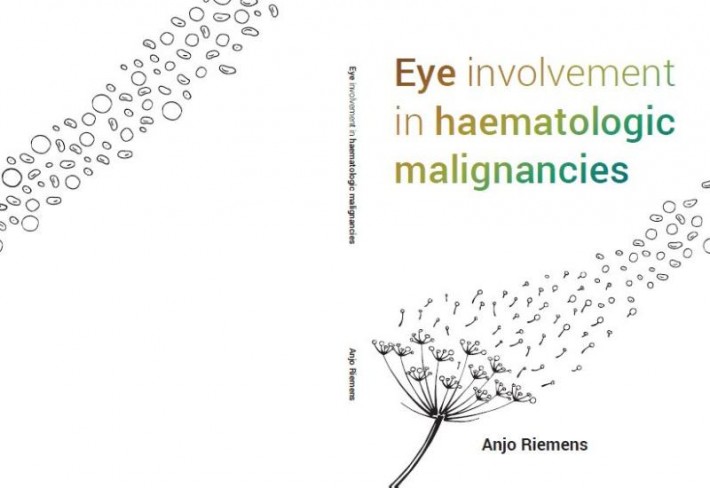dit werk kent de volgende uitvoeringen
Paperback
ISBN9789088917578
verschijningsdatum11/02/2014
verschijningsdatum11/02/2014

Over het proefschrift:
This thesis describes the involvement of the eye in haematological malignancies and focuses on two
topics; primary vitreoretinal lymphoma (PVRL) and ocular Graft-versus-Host Disease (GvHD). The aim of this thesis is first: to compare the efficacy of diverse treatment options of PVRL with regard to prevention of subsequent central nervous system lymphoma (CNSL) and second: to provide an insight into clinical manifestations, pathogenesis and treatment strategies of ocular GvHD.
Ocular involvement in patients with haematological malignancies remains frequently unrecognised and is in consequence not adequately treated. The patients are commonly severely ill and ocular problems might be overshadowed by more severe and acute systemic problems. However, ocular involvement in these malignancies may cause permanent damage of visual acuity and its timely recognition and treatment can prevent unnecessary visual loss.
The treatment of PVRL with CNSL as outcome was explored in 95 patients from 7 different countries in Europe and the additional benefit of an extensive treatment approach for PVRL in patients without evidence of CNSL on MRI or CSF examinations could not be proven and was associated with more severe adverse effects. In another study 9 patients were reported with intraocular DLBC lymphoma that also developed lymphomas in other immune privileged sites. These findings favour the existence of immune privileged-site lymphoma. The awareness of the existence of this type of lymphoma might improve its recognition in the future.
The other chapters in this thesis focus on ocular GvHD. The current data on ocular GVHD summarized and novel treatment options for this severe ocular disorder are discussed. New guidelines from the Chronic Ocular GVHD Workgroup are described and it is proposed to change the currently used NIH Consensus Diagnostic Criteria and to include chronic ocular GVHD as a diagnostic criterion.
Several aspects of ocular GvHD are studied in this thesis. We show that in patients three years after allogeneic stem cell transplantation (allo-SCT) the visual quality of life (QoL) is impaired because of ocular GvHD. Rising age is a major predictor for the development of ocular GvHD in both children and adults.
Cytokines in tear fluid were analysed and IL-6 and IFN- were elevated in tear fluid of patients with ocular GvHD and correlated with different symptoms of dry eye disease, suggesting that IFN-y is elevated during the early stages and IL-6 is involved in later stages of ocular GVHD and exhibits moreover an association with its severity.
In this thesis it is described that intraocular infections after allo-SCT are currently uncommon due to systematic use of current pre-emptive treatment regimens, frequent controls and early treatment of systemic infections.
A one year pilot evaluation of a prospective trial is described and discloses that patients treated with Cyclosporin A eye drops had significantly better Schirmer's test values six months after allo-SCT than patients treated with Polyvidone eye drops. However this study will be continued to include more patients and more definitive conclusions can be drawn.
Over de auteur:
Anjo Riemens werd geboren op 5 november 1983 in het St. Antonius ziekenhuis te Nieuwegein. Ze groeide op in 't Goy, een klein dorp in de provincie Utrecht. Na het behalen van haar VWO-diploma aan het college de Heemlanden te Houten begon ze haar studie geneeskunde aan de Universiteit Utrecht. Tijdens haar studie maakte ze meerdere lange reizen naar zowel Azië als Latijns Amerika welke ze combineerde met vrijwilligerswerk en (talen)cursussen. Haar interesse en fascinatie voor de oogheelkunde werden gewekt tijdens een coschap oogheelkunde in Nepal in 2006. Hierna volgde ze een tweetal (keuze) coschappen oogheelkunde in het UMC Utrecht en voerde ze een wetenschappelijke studie uit naar intraoculaire HIV in Chiang Mai in Thailand onder begeleiding van Prof. Dr. Aniki Rothova. Vanaf maart 2014 zal zij voor een jaar naar Rwanda en Suriname gaan om onderzoek te doen op het gebied van retinoblastoom en uveitis waarna ze in het voorjaar van 2015 zal starten met haar opleiding tot oogarts.